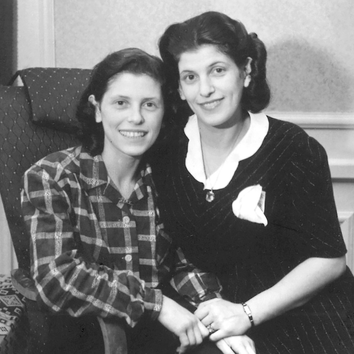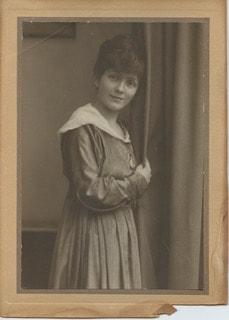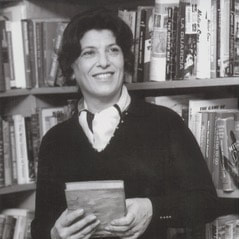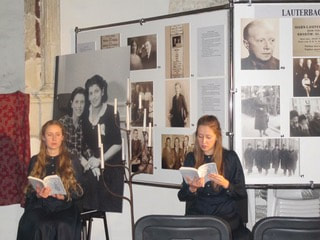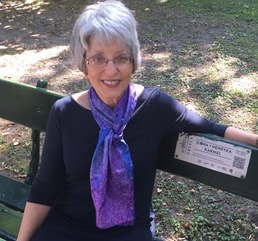Chapter 16: One Day the World Will Be the World AgainBy Joy Wolfe Ensor, daughter of Henia Karmel and Leon Wolfe
There was barely enough room to hold all the memorial candles that my parents lit every Yizkor. The tiny galley kitchen in our New York City apartment was short of counter space, and the bookshelves were not flameproof, so the candles were arrayed on a rolling Salton hot table, tucked in the hallway outside my bedroom. There was a candle for each of my grandmothers; another two for my grandfathers; and “one more for everyone else,” including nine of my father’s ten brothers and sisters and almost all of their offspring – the “sweet children of the family.” The candles flickered through the night, casting shadows that danced on the walls and ceiling just outside my bedroom door. Those flickers and shadows terrified me as a child. I dreaded having to cross their path to go from my room to the bathroom. I would hold off as long as I could, and then, covering my eyes and crouching low, skitter past the candles as quickly as I could, lest the ghosts in the flickers grab me. It never occurred to me to ask my parents to roll the hot table to a different location. I never told them that I was frightened. I knew from my father’s burning eyes and my mother’s overflowing ones that the candles signified something terrible; both my parents seemed to retreat into a dark and distant place until the last of the candles flickered out. I couldn’t grasp the enormity of their losses, but I imagined that somehow the dead lingered in those shadows. What’s a mother to do with the ghosts in the nursery? How does she bind up her own pain enough to pass the family legacy on to the next generation? When the time comes for her to explain to her children that they were named for murdered loved ones, how does she tell that story? In 1943, in the midst of the horror and degradation of the Skarżysko slave labor camp, my twenty-two-year-old mother wrote a defiant line: “My name is Number 906. And guess what? I still write verse.” Henia Karmel and her sister Ilona had already endured the terror of the Nazi invasion. Their family had fled Kraków for the East, but after their father was captured and deported to his death, they decided they were better off returning to the relative safety and community of the Kraków ghetto. From there, my mother, aunt, and grandmother were enslaved in Płaszów, Skarżysko, and Buchenwald. Along with the other prisoners, they were starved and beaten. They fell ill with typhoid and typhus. They watched as loved ones were taken off to their deaths. Their survival depended on contributing to the German war effort. Working under horrific conditions, they stuffed munitions with poisonous picric acid that infiltrated their lungs and yellowed their skin. And yet, through all of this, Henia and Ilona wrote poetry, on sheets of paper smuggled into the barracks from the slave labor factory. In the progressive Jewish academy they’d attended until the outbreak of World War II, the sisters had studied Polish, learning Adam Mickiewicz’s classical romantic verses and Julian Tuwim’s experimental poetic forms. They loved Poland and her literature, even though, my mother lamented, Poland never loved them back. ADDITIONAL FAMILY RESOURCES [by Joy’s aunt] Karmel, Ilona. Stephania. Boston: Houghton-Mifflin, 1953. [by Joy’s aunt] Karmel, Ilona. An Estate of Memory. Boston: Houghton-Mifflin, 1969; New York: The Feminist Press of the City University of New York, 1986. [by Joy‘s mother] Karmel-Wolfe, Henia. “Seder in a German Concentration Camp.” Originally published in American Mizrachi Women. Republished in Dov Peretz-Elkins (Ed.), Jewish Stories from Heaven and Earth: Inspiring Tales to Nourish the Heart and Soul. Woodstock, VT: Jewish Lights Publishing, 2008. [by Joy‘s mother] Karmel-Wolfe, Henia. The Baders of Jacob Street Philadelphia and New York: J. B. Lippincott & Co., 1970. [by Joy‘s mother] Karmel-Wolfe, Henia. Marek and LIsa: A Love Story. New York: Dodd, Mead & Co., 1984. [by Joy‘s mother and aunt] Karmel, Henia and Ilona. A Wall of Two: Poems of Resistance and Suffering from Kraków to Buchenwald and Beyond. Adapted by Fanny Howe. Berkeley: University of California Press, 2007. [by Joy‘s nephew] Wolfe, Aaron. “Grandpa's Secret Shoah.” Tablet Magazine, April 19, 2012. [by Joy‘s daughter] Ensor, Hannah. Love Dream With Television (poems). Blacksburg, VA: Noemi Press, 2018. |
